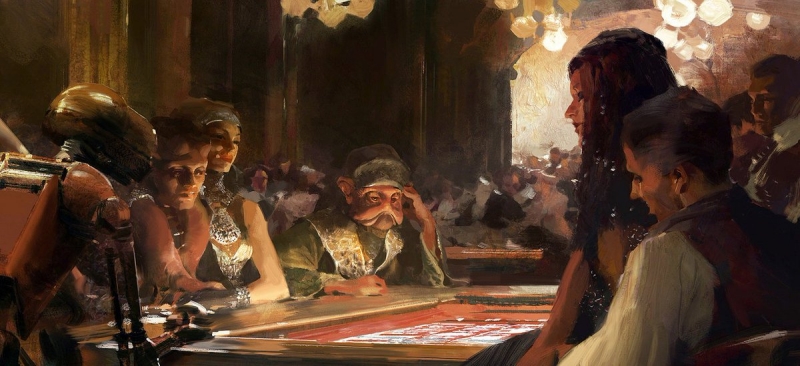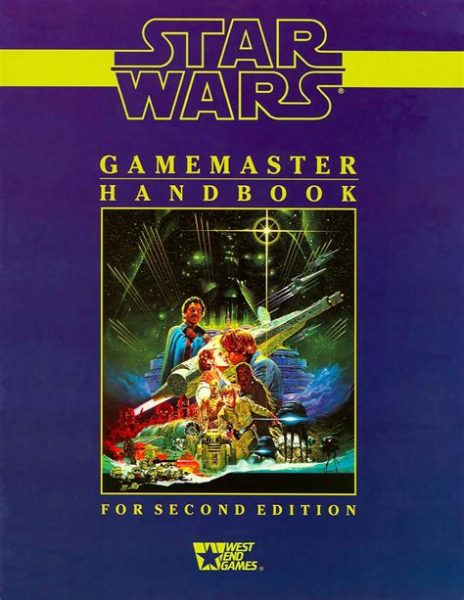This is another post I originally wrote last year about the Star Wars Roleplaying Game, which I think would be of interest for readers of this site.
I’ve recently been part of a discussion about rarely used skills in Star Wars campaigns. Gambling in particular seems like a skill that has little actual use for players and that is difficult for GMs to work into adventures in a meaningful way.

In this case, I think the burden of making the skill useful really does fall primarily to the player. You chose to invest points into the gambling skill, or to take gambler as your character archetype. Of course it is good form for the GM to be accommodating and make an effort to allow players to play to their characters’ strengths. But when you want to play a gambler, or any other character with a focus outside the typical adventure activities for the setting or genre, it falls to you to come up with an idea how it will be part of the campaign.
While I don’t have the slightest idea how to make use of basket weaving in an adventure campaign, I do see quite a number of options of how you can make gambling a meaningful part of a Star Wars campaign, and to some extend in RPGs in general.
When you think of the main purpose of gambling, making money is the obvious answer. But in a Star Wars game, money generally does not play a meaningful role, as all the equipment you really need is a blaster for every character and a small ship for the whole party, which you often get at a very early point of the campaign. It’s not a setting where characters are constantly upgrading their equipment with potato peelers +2 or you have a dozen types of increasingly protective and expensive suits of armor. Like in Sword & Sorcery fantasy, money appears as something much more abstract within the stories, really only mattering when the characters are faced with a massive debt or huge expense that will be impossible to cover unless they take on that one suspiciously well paying job or find the fabled treasure of legend. The need for large amounts of money is an adventure hook, an excuse to get the players to go to a place where the GM has something prepared for them. And in that case it’s in nobody’s interest to have some characters spend a whole session in a casino and play 50 rounds of cards. Which is why the amount of money you can make with gambling or picking pockets is usually trivially low.
My suggestion is forget about money. Don’t go gambling to get rich as a simpler (and boring) alternative to go on an adventure. What really makes gambling interesting from a story perspective are the debts that result from it. When you play a gambler, or any character with a high gambling skill, try to get into games with imperial officers and gang leaders and get them into debt. Because debt means leverage.
This is one of the cases where the GM has to be accommodating. The GM can always say that the NPC in question does not gamble, doesn’t play with the PCs, stops playing when the credits run out, or has the necessary money at hand to pay the debt. But I think when you approach the GM with a plan to try manipulating an NPC through gambling debts, most GMs will be quite happy to give you a chance in at least some situations. It doesn’t make sense for all NPCs and in all situations, but this is just the kind of creative problem solving that I always love to see from players, and which makes running games the most fun.
When you have an NPC in debt, you can have the leverage to either get information or a favor. Have the NPCs tell you about other people you are really after or about places you want to get into, or ask them to do small things that will greatly help you overcoming some obstacles for your big plan. Getting you access keys, disabling alarms, planting bugs, distracting guards, that kind of thing.
But as it says in the name, gambling is always a gamble, and there’s always a real chance that even a master gambler fails and ends up being the one losing a lot of money. Which ultimately can lead to the player ending up in deep debt to important and influential people. Which from a narrative perspective is awesome! We get to increase the tension for the current adventure and have the players facing even more obstacles than they did before, and they all know perfectly well that it’s purely the result of their own actions. These are the best kinds of consequences and a fantastic example of failing forward.
Another way in which gambling can be useful is simply as a cover while spying on NPCs or checking out places. When you’re sitting at a table loosing great amount of credits (or winning them), nobody is suspecting you to be in the place for other insidious reasons. Gambling is a nice way to get NPCs into conversations and to make them let their guard down by either separating them from their credits or making them enjoy a winning streak. The richest and most powerful people usually tend to play in places where the stakes are very high, and being very good at gambling is a classic trait of various villainous archetypes. You might be able to get a simple customs officer or low ranking gangster into a low stakes game in some cheap cantina, but when you want to go against crime bosses and moffs, you have to be able to play with the pros. Both in skill and the money you bring to the table. So as your gambling skill increases, you don’t just improve your chances of success, but also gain access to more influential and important people.
There doesn’t seem to be any obstacles in a typical adventure that your character can overcome by making a gambling check. And while it may look like a way to make some easy money at the side, like you can do with picking pockets and cracking safes, you really should think of it more as a skill to help you get access to information and objects that are not easily available otherwise. More than anything else, gambling is a social skill. When you approach it like this, the potential situations in which it can win the day broaden considerably.
I think adding gambling as a skill to Stars Without Number would be a great addition to the rules to better reflect the style of adventures I want to create with it.

